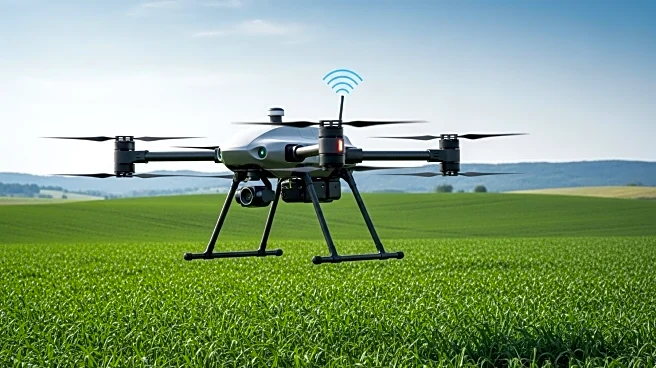What's Happening?
The drone farming market in the United States is experiencing significant growth, driven by advancements in AI and autonomous technologies. PrecisionHawk has launched an AI-enabled drone fleet for crop monitoring in the Midwest, providing real-time multispectral imaging for plant health analysis. DJI Agriculture has partnered with U.S. farms to deploy autonomous spraying drones, which adjust spray patterns based on canopy density and weather conditions, reducing chemical usage and operational costs. AgEagle has introduced precision mapping drones integrated with AI analytics for soil and crop management, enhancing yields and resource efficiency. John Deere has unveiled a drone-assisted crop scouting system in California, combining aerial imagery with predictive analytics to detect stress and disease early, improving crop management and reducing losses.
Why It's Important?
The expansion of drone farming technologies is crucial for modern agriculture, as it enhances productivity and efficiency through precision technologies. Drones equipped with high-resolution cameras, sensors, and GPS enable real-time crop monitoring, soil analysis, and pest detection, allowing farmers to make data-driven decisions. This reduces labor costs, optimizes input usage, and improves overall farm management. The adoption of drone farming is driven by the need for higher yields, resource efficiency, and sustainable farming practices. Continuous innovations in drone technology, AI integration, and autonomous flight systems are further strengthening their capabilities, making drones a transformative tool in agriculture.
What's Next?
The drone farming market is expected to continue its growth trajectory, with rising global food demand and the push for smart agriculture solutions accelerating adoption across large-scale and smallholder farms. Government initiatives and subsidies promoting digital and mechanized farming are supporting market growth. The ability to monitor crop health and predict yield accurately enhances profitability and risk management for farmers. As drones become more integrated into farming practices, they are likely to play a key role in sustainable agriculture, offering precision, efficiency, and improved resource management.
Beyond the Headlines
The integration of AI and autonomous technologies in drone farming raises ethical and legal considerations, particularly regarding data privacy and the impact on traditional farming jobs. As drones become more prevalent, there may be discussions around regulatory frameworks to ensure safe and responsible use. Additionally, the shift towards technology-driven agriculture could lead to long-term changes in farming practices, potentially influencing cultural perceptions of farming and food production.








